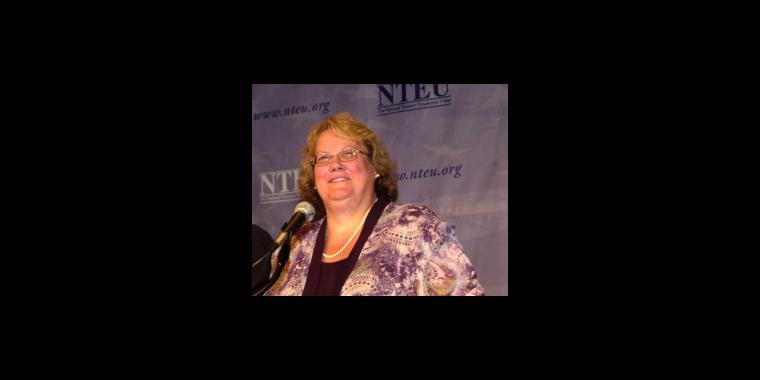
Kelley Chides Impasses Panel for Consistent Pro-Agency Stance, Failure to Hire Professional Staff
11/27/07: Nearly six years ago, NTEU National President Colleen Kelley expressed her serious concern about politically-driven appointments to a key federal panel dealing with complex federal labor-management relations who have no background in the issues.
Since that time, said Kelley, “my concerns unfortunately have been more than realized, in the face of a near 80 percent pro-management bias in issues decided by the Federal Service Impasses Panel (FSIP), a cutback in its professional staff of six to only two, and a significant lengthening in the time it takes to get a decision.”
The role of the seven-member FSIP is to resolve impasses that might occur when agencies and their unions bargain over conditions of employment. Its decisions are final. Federal law requires that presidential appointees to the panel be familiar with governmental operations, and knowledgeable about labor-management relations.
A July Government Executive Magazine article, however, stated that unlike panelists under the previous administration, only one current panel member has “extensive labor law experience. The panelists with prior government experience did not focus on labor law or mediation.”
An NTEU review found the current panel has chosen the management position on individual issues much of the time. In the 12 months ending in late October, President Kelley said, the panel has ruled for management 47 times, for employees on 12 occasions.
A similar analysis by Government Executive, published last July, of 75 cases from the current panel and 75 from the previous panel found that the Bush panel ruled in management’s favor in 68 percent of cases and in the unions’ favor in 19 percent, brokering compromises in 8 percent of the cases. Whereas the Clinton panel, ruled in management’s favor 44 percent of the time, for the unions 25 percent of the time and reached compromises in 27 percent of the cases.
The danger to the nation and to taxpayers of the panel taking such a one-sided approach along with its cut in professional staff members, Kelley said, is that current members make extensive use of what is known as the “last, best offer” method to settle disputes. Under this approach, the parties submit their last, best proposals, and the panel — despite how many issues may be in dispute — picks one it believes decides the entire dispute and bases its ruling on that single item.
“A true neutral body would weigh the evidence in each individual issue, just as a court does,” said Kelley. Increasing professional staff would go a long way toward assisting the panel in weighing issues on their merits. In 2001, there were six full-time professional employees assisting the panel. That number has dwindled to two.
In light of that decline, the union also took issue with the retention of a political appointee, hired by the Federal Labor Relations Authority (FLRA), as liaison to the FSIP. The appointment is outlined in documents NTEU obtained through the Freedom of Information Act. The FSIP is a unit of the three-member FLRA, which oversees federal sector labor relations.
“There is really no justification for the hiring of a liaison to the FSIP,” Kelley said, “when the real need at the FSIP is for independent, professional staff trained and experienced in federal labor-management relations.”
She said the position should be abolished, and some of the money used for more frequent travel of panel members to Washington to resolve cases more quickly. The FSIP’s travel budget has been reduced from $62,000 in 2001 to only $25,000 this year, documents show.
Federal agencies, of course, know full well of the panel’s pro-management disposition, so they adopt extremely hard lines in collective bargaining, forsaking the usual give-and-take that of necessity accompanies a two-party process and instead seek to declare a bargaining impasse, in hopes of getting the entire contract before the FSIP for a favorable decision.
“The most successful agreements are those that are hashed out at the bargaining table. This FSIP needs to do far more to encourage compromise,” President Kelley noted.
